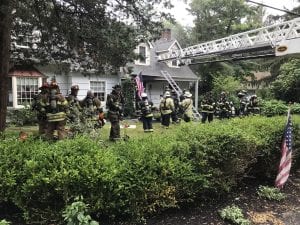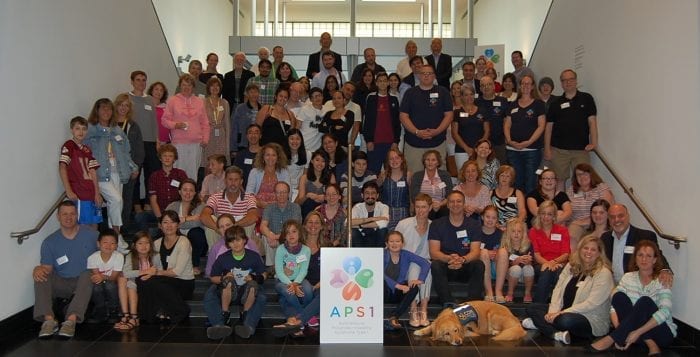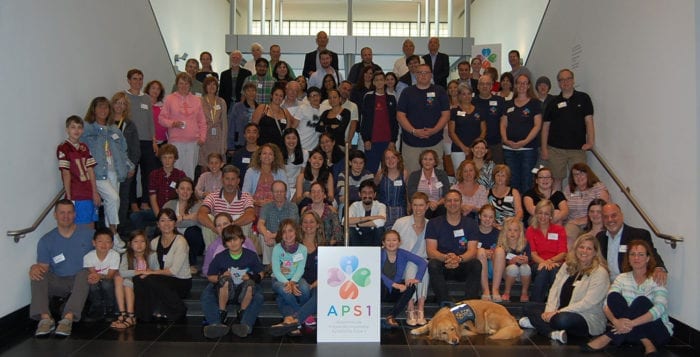By Leah Chiappino
After a house fire this summer, one Stony Brook family learned a valuable lesson.
“People come first, things a distant second,” Dave Seyfert said.

He and his wife Sherri are two of the founders of the APS Type 1 Foundation, which aims to make physicians more aware of the rare disorder. APS type 1 is a rare autoimmune disease that affects one in two million people in the United States.
The couple arrived home one day to the house fire shortly after the foundation’s third symposium in National Harbor, Maryland, in July. The family is currently renting a house and is hoping to return to their own home in a few months.
The Seyferts said that their spirits were not diminished by the tragedy, in which everyone, including the family dog, was safe, because they are pleased with the research and outcome of the symposium. When discussing how well they were coping, Dave Seyfert said, “APS puts things in perspective. When you have a child that’s sick your whole world stops. Nothing else is important — it doesn’t matter what you look like or if you’ve slept.”
He added in a follow-up email, “Sherri and I also share a deep faith in God which again helps put things in perspective.”
As reported by TBR News Media in 2017, the Seyferts’ son, Matthew, was diagnosed with autoimmune polyglandular syndrome type 1, known as APS-1, in 2006. The condition causes vitamin D, which provides calcium to the bones and muscles, to have a difficult time metabolizing. While symptoms can include bone mass problems, cramping and an irregular heartbeat, all patients are plagued with Addison’s disease, hyperthyroidism and candidiasis.
According to Dave Seyfert, APS-1 is unique among other genetic disorders because there is only one gene mutation, so researchers think there is a link to discovering cures for other autoimmune diseases, such as diabetes.
The symposiums are meant to be a haven for APS-1 research, as well as a meetup for families and patients to build a community of support.
“There are a lot of families going through a rare diagnosis, and you feel like you are all by yourself,” Dave Seyfert said. “We want to share with other families that it’s amazing what we achieved [in terms of research] by working together.”
“We want to keep going until we find every APS patient.”
— Sherri Seyfert
The foundation, whose mission involves research, education and raising awareness, became a 501(c)(3) in 2014. That was eight years since the Seyferts had started hosting basket raffles. Also, Todd and Heather Talarico of New Jersey, the former being the current foundation president, organized their first golf outing in 2006 that raised approximately $35,000 for the National Organization for Rare Disorders, known as NORD, which was used to grant research. According to Sherri Seyfert the foundation recently funded its seventh research grant for $100,000 through NORD, which takes the organization’s grant funding to more than $500,000.
Two board members, Robin Finch and Jennifer Orange, both of whom have a child with APS-1, joined in 2016, after the foundation held its first symposium, which was located in Toronto in 2015.
“Researchers from all over the world came and spoke on APS type 1,” Sherri Seyfert said. “It was the first time this community of patients and families were able to come together and met each other.”
A second symposium in 2017 was hosted personally by the Seyferts at Stony Brook University.
The board has grown to its current six members and, in addition, they have quarterly conference calls with physicians from all over the world so they can collaborate.
Dave Seyfert said he is pleased with the outreach of the foundation. He said Todd Talarico was on the TV show “Mystery Diagnosis,” and a grandmother watching realized her granddaughter suffered from the disease. An American serviceman stationed in Italy was in the hospital with his son and, upon doing research, came across the foundation’s website and realized his son had APS-1. Patients at Stony Brook Children’s Hospital were diagnosed upon a doctor reading a research article on APS-1 written by physicians all over the world, who connected at past symposiums and were published in The New England Journal of Medicine. The article was funded by the foundation.
Furthermore, NORD has granted the foundation funding for a comprehensive study of APS-1, logging patients and their symptoms. While 95 percent of the condition is treatable, experts estimate that a thousand patients are living
undiagnosed.
“We want to keep going until we find every APS patient,” Sherri Seyfert said. “People pass away from not knowing, and so many struggle with so many health issues and organ damages for years because they are not diagnosed quickly enough.”
Finch, a California-based attorney who was assisted by Todd Talarico in getting her daughter diagnosed, is the foundation’s recording secretary and feels as though she owes a lot to the Seyferts.
“The passion and the time and energy they gave to the symposium at Stony Brook was just invaluable,” Finch said. “They’re both just the kind people who try so much to make Matthew and other kids’ lives better. Dave, in particular, feels so deeply about things, and his commitment to my family and the disease’s community is so incredible. They’re the heart and soul of this group.”
Orange, the foundation’s vice president, added praise for the Seyferts.
“The Seyferts are community builders and have a great way of bringing people together and getting people to realize what a community can do,” she said.







